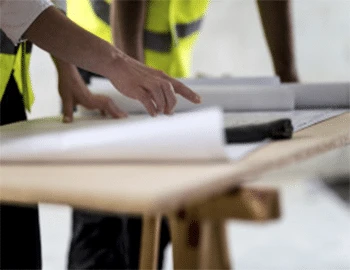3 Key Skills Needed to Advance in Construction Management

3 Key Skills Needed to Advance in Construction Management
Construction managers are in high demand–and it’s a great position that you’ve had your eye on for quite some time. When you’re interested in this critical promotion, however, you want to make sure that you have the skills you’ll need for your new job. These three key skills will help you advance in construction management and acquire the job of your dreams.
Organization Skills
Construction Management Skills Career Advancement
As a project manager, you’ll need to keep your project running smoothly–and that means staying organized. If you struggle to locate your tools at the end of the day or you never know what you’re going to be doing until you arrive at the job site each day, your
organization skills need some work before you can advance to construction management. Work on staying aware of what’s going on around you and keeping track of your own equipment. Develop strategies for keeping your truck organized. Starting with personal organization is a great way to increase your ability to organize larger projects.
- Problem Solving Skills
As a project manager, you’ll be responsible for managing the problems that crop up in every project. There’s no passing it off to someone else now; you’re the one who needs to come up with a solution! Start with the problems you see on construction sites now. Do you see a potential solution? Present it to your current project manager along with the issue. They’ll appreciate the initiative, and you’ll be gaining valuable new skills.
- People Skills
Project managers don’t have the luxury of just working with their hands. You’ll need to get to know the people around you: learning their strengths and weaknesses, understanding what combinations of workers fit well together, and understanding what’s needed in order to motivate specific employees. Start small as you learn how to interact with other members of your team–especially the ones that you don’t like. Develop your negotiation skills. As a project manager, your interactions with people are more important than anything else on the site!
Moving on to project management is an important step–and it’s one that, in many cases, has little to do with your skills as a contractor. By developing these three key skill sets, you’ll discover that you’re in a much better position to attain this type of promotion. Start developing your professional skills today to acquire the job you’ve always dreamed of.
Michael DeSafey is a leading executive recruiter for professionals in the construction, engineering and environmental industries. He is currently the President of Webuild Staffing www.webuildstaffing.com . To learn more about Michael or to follow his blog please visit www.michaeldesafey.com
5 Steps to Successful Employment Offer Negotiations

5 Steps to Successful Employment Offer Negotiations
Many job candidates in the construction industry fail to negotiate when they receive an employment offer. Failure to engage in employment offer negotiations typically stems from an applicant’s lack of negotiation skills, fear of rejection, or worry that attempts to negotiate will anger a hiring manager. Construction and engineering professionals should arrive at the negotiating table armed with current salary data and a summary of their special skills. Below are five tips designed to help professionals in the construction and engineering industries successfully engage in employment offer negotiations.
1) Do your research. Arrive at the negotiating table armed with the latest statistics and salary trends in the construction or engineering industries. Make sure that the data you reference possesses the following attributes:
- Citing data from the past twelve months will help your case.
- Statistics and salary data that you cite should correspond to the position you seek and your qualifications.
- Cite data from credible sources such as the U.S. Bureau of Labor Statistics
2) Have your brag book on hand. Do not be afraid to remind employers of your accomplishments, awards, and notable projects you managed. You should also reference any contributions you have made to your local community. Summarize your professional achievements and activities in an organized format that will delight employers and enhance your odds of securing your dream offer.
3) Highlight your special skills and certifications. When you negotiate for additional compensation or job-related perks, you need to be ready to justify your value as an employee. Examples of relevant certifications or special skills that would help your negotiation efforts include the following:
- Certified Construction Manager (CCM)
- Certified Professional Construction Certification (CPCC)
- Construction Engineering Certification
Be prepared to compromise. Ideally, you will succeed with your negotiations. However, there is a chance that an employer will reject your request or present a counteroffer. Remember to respond gracefully regardless of the news that you receive.
5) Follow up. It is unlikely that you will receive a confirmed offer immediately after you finish negotiating with a potential employer. In most cases, hiring managers will require time to finalize a decision and prepare an updated offer. In the interim, follow up with the employer to express your appreciation for considering your request.
Do not enter approach employment offer negotiations without a strategic plan. By following the tips above, you can increase your odds of success at the negotiating table and receiving the employment offer that you deserve.
Michael DeSafey is a leading executive recruiter for professionals in the construction, engineering and environmental industries. He is currently the President of Webuild Staffing www.webuildstaffing.com . To learn more about Michael or to follow his blog please visit www.michaeldesafey.com
Superintendents are In Demand: Is It the Position for You?

Superintendents are In Demand: Is It the Position for You?
In the current employment landscape, construction professionals are in sort supply. If you’re interested in becoming a project superintendent, now is the time to put together your resume, build your skill set, and put yourself out there. There are project superintendent jobs waiting on you!
What Are the Skills a Project Superintendent Really Needs?
As a future project superintendent, you want to make sure you have the skills you need to be successful in your industry. These include:
- The ability to schedule and coordinate a variety of subcontractors and other vendors who may need to work on the job site.
- Management skills, including supervising both members of your team and subcontractors.
- A basic understanding of most common construction methods and practices so that you’ll be able to help your crew finish up and determine whether or not subcontractors are performing their jobs correctly.
- Checking the quality of the work that’s been done on the job site in order to ensure that the client is getting the high quality they expect from the company.
- Paying attention to the costs associated with the project in order to ensure that it remains under budget while still providing high client satisfaction.
Are You a Good Project Superintendent?
If you’re thinking about becoming a project superintendent, it’s important that you know whether or not the position is a good fit for you. The last thing you want is to end up in a job that you’re unable to do properly, especially with an entire job site resting on your shoulders! Ask yourself these key questions if you’re considering pursuing a job as a project superintendent.
Am I a people person? As a project superintendent, you’ll need to work with a variety of people on a regular basis. You’ll interact with clients, subcontractors, and contractors. Instead of spending your entire day working with your hands, you’ll spend a large percentage of it interacting with people. Are your people skills up to the task?
Am I able to think quickly and solve common problems found on construction job sites? From knowing how to respond to an unplanned visit from OSHA to problem that has the potential to put your entire project behind schedule, you need to have substantial problem-solving skills when you’re working as a project superintendent. You become the go-to problem solver for every member of the team, and you need to be able to provide them with answers. Even when you don’t have those answers, you need to know who does!
Am I a good leader? People skills are one thing. It’s another thing entirely to be the person responsible for motivating and inspiring your team. Do you possess the necessary leadership qualities that will enable you to evaluate your team’s strengths, put people in the right positions to make the greatest benefit for the team as a whole, and improve your team’s morale when things aren’t going well?
Am I organized and able to juggle multiple tasks on a job site? As a project superintendent, you’ll be responsible for coordinating the efforts of everyone on the job site and ensuring that everything is done–and done correctly. If you don’t have the organizational skills to make that happen, you’re going to struggle with your job sites.
Do I know how to evaluate the quality of the job that’s been done? If you haven’t been in construction long or have never worked outside a very specific skill set, you might not know how to evaluate the quality of the work your subcontractors have produced. Make sure, before embarking on your journey as a project superintendent, that you have a basic understanding of how to tell the difference between quality work and subquality work in every subcontractor you have the potential to deal with.
Working as a project superintendent is a highly rewarding career that allows you to take your construction skills to the next level. If you have the necessary skill set, it’s time to start putting the pieces together and apply for a new job. You could be the one in charge of the job site before you know it!
Michael DeSafey is a leading executive recruiter for professionals in the construction, engineering and environmental industries. He is currently the President of Webuild Staffing www.webuildstaffing.com . To learn more about Michael or to follow his blog please visit www.michaeldesafey.com
How to Navigate the Job Marketplace

How to Navigate the Job Marketplace
Whether you’re fresh out of school and ready to start your career or you’re hoping to move jobs within the construction or engineering industries, navigating the job marketplace can be confusing. Finding open positions is often challenging, especially during slow times. Even more challenging is the struggle to find the company that’s right for you. If you’re ready to start navigating the job marketplace, following these key tips can help.
Build Your Network
From the first time you set foot on a job site or in a professional venue where you have the opportunity to interact with construction workers, engineers, subcontractors, and others within your field, you need to focus on building your network. Develop potential connections.
Get to know people. Whether you’re just starting out or you know you’re going to be changing jobs soon, building your network is the key to knowing what positions are open and getting your foot in the door with employers to find your next career opportunity.
- Carry business cards. This may seem like a cliche, but it’s one of the best ways to literally get your name in the right hands.
- Visit trade shows and talk people there.
- Get to know the people who are coming to your job sites. You never know when one of them will be ready to offer you your next job.
- Volunteer. Whether you’re just starting out in construction or you’ve been working in a specialized position for years, there are jobs out there that need to be done. Check out Habitat for Humanity in your community, donate your time to a local school that’s trying to get a building repaired, or work with local churches as they handle building mission trips. Contractors in your community are working there, too–and they’ll take note of your presence and the quality of your work.
Try to Leave on Good Terms
You know that your current job isn’t working out. Your superintendent has a bad attitude, your hours keep you away from your family when you most need to be with them, and the terms of the contract you signed aren’t being adhered to. No matter how bad it is, however, you want to make sure that you leave your current job on good terms. Give appropriate notice, try not to leave in the middle of a project, and keep your work ethic strong even in the last days of your employment instead of trying to “go out with a bang.” The construction and engineering communities in your city are relatively small, and burning your bridges with one company may make it harder for you to get your next job.
Build Your Skills
Both the construction and the engineering industries are experiencing a shortage of qualified individuals to take those open positions. That means that the more skills you have, the more positions are open for you. Taking the time to develop specialized skills will make it far easier for you to acquire a job in the future. Any time you’re on a job site, ask questions. While you shouldn’t walk away from your own work to watch or help someone else, being available and willing to learn new skills is the mark of a great construction worker–and those skills can be of immense benefit to you later.
Work with a Staffing Company
Staffing companies that are specifically dedicated to construction or engineering are a great first step, especially if you’ve been struggling to get a job or are afraid that you’ve left a bad impression on a previous employer that might be impacting your future employment opportunities. A staffing company can help get you a temporary or long-term position that could eventually turn into permanent employment, especially if you take advantage of that position to improve your network and reach out to other potential employers.
Navigating the job market can be frustrating, but it’s not impossible! By following these key steps, you’ll find the right job for you and improve your chances of being hired at the company of your choice. While it might not happen overnight, there’s a job opening with your name on it. You just have to find it!
Michael DeSafey is a leading executive recruiter for professionals in the construction, engineering and environmental industries. He is currently the President of Webuild Staffing www.webuildstaffing.com . To learn more about Michael or to follow his blog please visit www.michaeldesafey.com
Tough Job Interview Questions You Should Be Asking

Tough Job Interview Questions You Should Be Asking
As a hiring manager, there several things you want to know about potential candidates. You want to know that they’ll be hard workers, that they have the skills required for the position, and that they’re bringing a great attitude to your workplace. There are some questions that are hard to ask when you’re sitting in an interview–and hard to answer when you’re sitting on the other side of the table–but these tough questions are critical to getting to know your candidates.
1. What salary range do you expect from this position? Whether you’re working for an environmental firm or a construction company, you want to set this question on the table early. Your goal is to get the candidate to name a number–hopefully a lower number than the amount you’ve got budgeted.
2. Why are you leaving your current position?
This question puts the candidate on the spot, but it will also tell you a lot about their personality. There are several key things to look for in the answer:
• Does the candidate list things that are equally common in the position they’re applying?
• How does the candidate talk about their former employer?
• Does the candidate have a laundry list of complaints from their previous jobs?
• Is the candidate positive about new career opportunities with your company?
3. Have you ever been fired or laid off from a previous position? Why? Ouch! The best candidates may have stories about past failures that led to them being laid off–and those stories are things you need to know about them before you hire them. If you’re going to ask this question, however, be sure you give the candidate an opportunity to prove the changes they’ve made as a result of being fired in the past. For example, a construction worker who was guilty of slacking off on job sites in the past might have become an exemplary worker since then. An engineer who was always late might have developed new habits so that they’re always the first one at a meeting. Give candidates room to grow, but understand their past failures, too.
4. Why should I hire you? Some candidates will go blank when they hear this question. Asking it, however, will give you a look at how the candidate views themselves and how they’ll perform in the position. How you ask this question, from your tone of voice to your body language, will help set the stage for the candidate’s answer.
5. What do you need, other than money, in order to ensure your job satisfaction? This is the candidate’s opportunity to tell you what they’re really looking for in their dream job–and your chance to learn whether or not your company can provide it. If the candidate’s expectations are far too high for your firm to reach, they might not be the right one for your open position.
6. Imagine giving your last boss a performance review. What do they need to improve? The candidate’s answer will give you a good look at their personality. It’s not information about the boss you’re looking for; instead, you’re looking to see what the candidate expects in a boss and how they handle things that they don’t like in a person.
7. What is your greatest weakness? Every candidate has a weakness. Most of them will try to give you an answer that they don’t see as being a true weakness. The best candidates, however, will give you a look at how they’re learning to overcome those weaknesses or how they have turned them into strengths.
Asking the right questions in a job interview is just as important as knowing what answers you’re looking for. Ideally, you want to ask questions that will help you learn more about the candidate’s deeper personally. The best questions will catch them slightly off-guard, without a prepared answer at hand. As you delve into those questions, you’ll get a solid look at what’s really behind a candidate’s interview persona–and that will go a long way toward helping you make hiring decisions.
Michael DeSafey is a leading executive recruiter for professionals in the construction, engineering and environmental industries. He is currently the President of Webuild Staffing www.webuildstaffing.com. To learn more about Michael or to follow his blog please visit www.michaeldesafey.com
